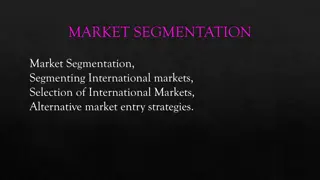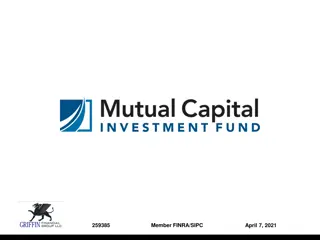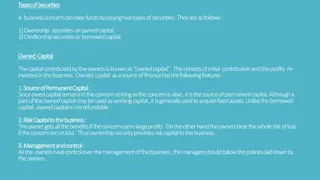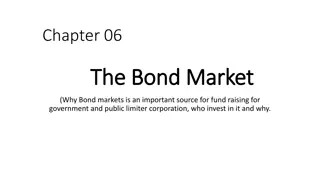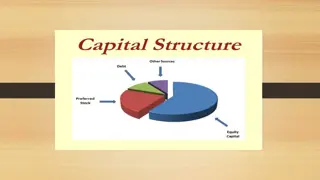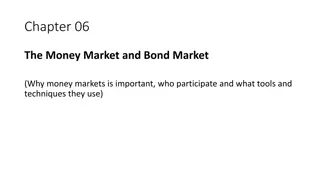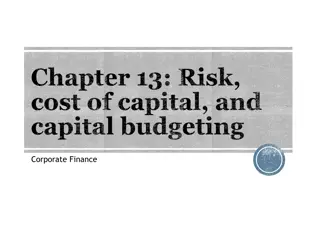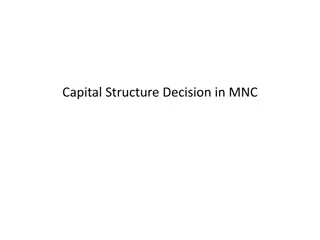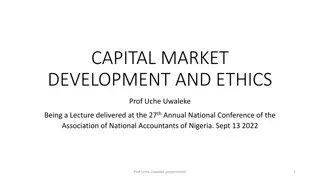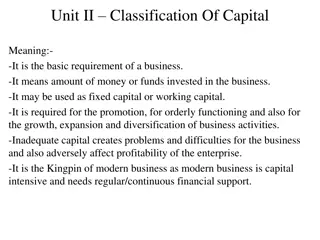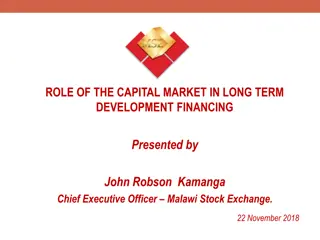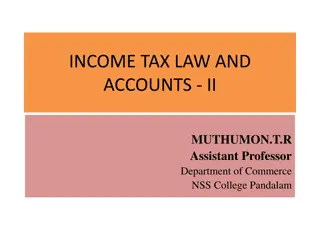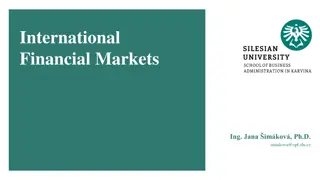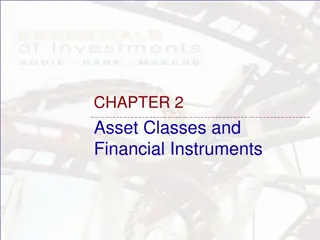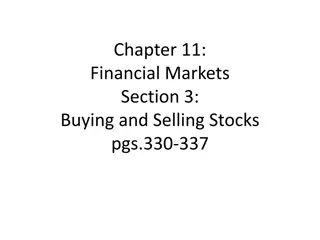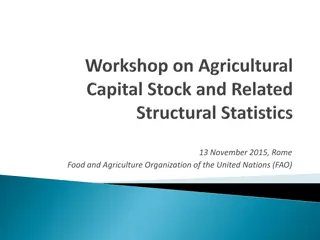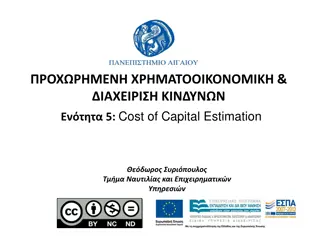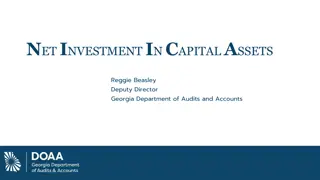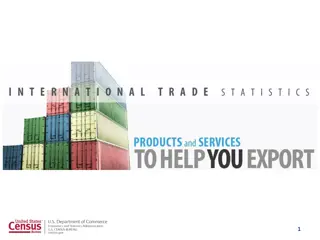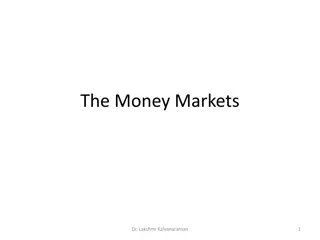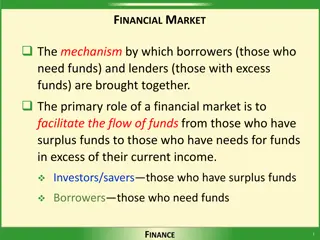Understanding Financial Markets in India
Financial markets play a crucial role in connecting lenders and borrowers, providing avenues for investment and capital generation. In India, the financial system includes money markets and capital markets, offering diverse financial products and opportunities for investors. Money markets deal with
2 views • 106 slides
CAPITAL STRUCTURE
Capital structure refers to the mix of a firm's capitalization, including debt, preference share capital, equity share capital, and retained earnings. Choosing the right components of capital is crucial based on the organization's function and risk level. Different patterns/forms of capital structur
1 views • 6 slides
Theories of Capital Structure and their Applications
The theories of capital structure explore the relationship between debt and equity in a firm's financing decisions. By optimizing the mix of debt and equity, a company can minimize its cost of capital and maximize its value. The Net Income Approach highlights the benefits of using debt to lower the
0 views • 7 slides
Factors Influencing Economic Growth: Human Capital and Capital Goods
Factors such as investment in human capital, capital goods, natural resources, and entrepreneurship play a crucial role in determining a country's economic growth. Human capital encompasses the skills and abilities of workers, while capital goods are the tools and equipment used to produce goods and
2 views • 28 slides
Aditya Birla Capital Scholarship for Classes 1 to 8.
The Aditya Birla Capital Scholarship is run by the Aditya Birla Capital Foundation and is designed to help students in Classes 1 to 12 and undergraduates with financial aid for their education. The program provides a one-time scholarship of up to INR 60,000 to cover academic expenses. \nTo Know More
0 views • 5 slides
Aditya Birla Capital Scholarship for Classes 9 to 12.
The Aditya Birla Capital Scholarship:\nThe Aditya Birla Capital Scholarship, run by the Aditya Birla Capital Foundation, aims to help students in school and college by offering financial aid and educational support. The scholarship provides up to INR 60,000 (one-time) for academic expenses, and st
1 views • 5 slides
Unlocking International Markets: Segmentation and Entry Strategies
Market segmentation plays a vital role in targeting international markets effectively. By segmenting customers based on various criteria, businesses can tailor their strategies to different market segments. This allows for the selection of the most suitable international markets and the implementati
0 views • 25 slides
Understanding Markets and Economic Structures
Markets play a crucial role in bringing buyers and sellers together for transactions. This article discusses the concept of markets, different types of markets in a capitalist economy, focusing on perfect competition. It outlines the features and conditions of perfect competition, emphasizing the im
2 views • 42 slides
Mutual Capital Investment Fund: Addressing Capital Needs in the Insurance Community
Mutual Capital Investment Fund, LLC, aims to provide capital to mutual insurance companies facing capital needs without converting to stock form or selling minority interests. Led by Mutual Capital Group, the Fund seeks commitments up to $100 million and offers a unique investment opportunity for mu
0 views • 8 slides
Understanding Eurocurrency Markets: A Comprehensive Overview
Eurocurrency markets facilitate the deposit and loan of currencies outside their country of origin. This includes Eurodollars, Eurosterlings, and other freely convertible currencies. These markets involve banks worldwide and play a key role in international trade and capital flow. Eurobanks are majo
0 views • 27 slides
Types of Securities: Owned Capital vs Borrowed Capital in Business Financing
Owned capital, contributed by owners, provides permanent risk capital to a business with high returns but lacks withdrawal flexibility. Borrowed capital, obtained through loans, offers fixed-period finance with tax advantages and flexible repayment options, but involves fixed interest payments and i
1 views • 9 slides
Understanding the Significance of the Bond Market for Government and Corporations
The bond market serves as a crucial source for fundraising for governments and public corporations. Investors use money markets for short-term needs and capital markets for long-term investments to manage risks. Various types of bonds are available, including Treasury notes and bonds, agency bonds,
0 views • 20 slides
Understanding International Capital Structure and Cost of Capital
Explore the concept of international capital structure and its impact on the cost of capital, including discussions on cost of equity, investment decisions, market segmentation, and cross-border financing. Learn how firms can lower their cost of capital through internationalization strategies, such
0 views • 19 slides
Features of an Appropriate Capital Structure and Optimum Capital Structure
While developing a suitable capital structure, the financial manager aims to maximize the long-term market price of equity shares. An appropriate capital structure should focus on maximizing returns to shareholders, minimizing financial insolvency risk, maintaining flexibility, ensuring the company
2 views • 5 slides
Understanding the Importance of Money Markets and Bond Markets
Money markets play a crucial role in the financial system by providing short-term, low-risk, and liquid investment options. Participants include institutional investors and dealers who engage in large transactions. Money market securities have specific characteristics, such as large denominations, l
0 views • 23 slides
Understanding Risk, Cost of Capital, and Capital Budgeting in Corporate Finance
Explore the concepts of risk, cost of capital, and capital budgeting in corporate finance, including the Capital Asset Pricing Model (CAPM), cost of equity, beta estimation, and cost of capital. Learn how to reduce the cost of capital and understand the impact of reducing the Weighted Average Cost o
0 views • 20 slides
Understanding Multinational Capital Structural Decision
Multinational corporations rely on capital to fund their expansion and projects. Capital structure decisions impact the cost of capital, profitability, and overall value. MNCs face complexities in balancing debt and equity for financing operations, choosing markets and currencies, and internationali
1 views • 37 slides
Understanding Capital Market Development and Ethics in Africa
Explore the nexus between capital market development, ethics, and the role of professional accountants in Africa's Agenda 2063 for inclusive and sustainable economic growth. Delve into the importance of ethical foundations, transparency, and trust in fostering fair and efficient capital markets. Lea
1 views • 46 slides
Understanding the Classification and Importance of Capital in Business
Capital is crucial for businesses, whether for promotion, functioning, growth, or expansion. It can be classified as promotional, long-term, short-term, or development capital. Factors influencing capital requirements include business activity, size, product nature, technology, business cycle, and l
2 views • 13 slides
Role of the Capital Market in Long-Term Development Financing
The presentation by John Robson Kamanga, CEO of Malawi Stock Exchange, delves into the role of capital markets in financing long-term development. Topics covered include defining capital markets, functions of stock exchanges, development finance, areas funded by development finance, the capital mark
0 views • 23 slides
Capital Gains and Assets Overview in Income Tax Law and Accounts
This content provides an overview of capital gains and assets in income tax law and accounts, covering topics such as types of capital assets, assets not considered capital assets, kinds of capital assets (short-term and long-term), transfer year of chargeability, computation of capital gains, and c
0 views • 15 slides
Understanding Capital Market and Its Significance
Capital market refers to the market for long-term finance where financial assets like Shares, Debentures, and Bonds are traded. It plays a vital role in mobilizing funds for companies and governments, facilitating capital formation, and promoting economic growth. The classification includes Industri
0 views • 11 slides
Understanding International Financial Markets: Key Insights and Considerations
International Financial Markets play a crucial role for Multinational Corporations (MNCs) in accessing foreign exchange, money, credit, bond, and stock markets. MNCs leverage the international money market for various purposes like borrowing short-term funds in foreign currencies and investing for h
0 views • 25 slides
Fiscal Year 2022 Capital Budget Presentation Overview
In the presentation to the Board of Finance, the Capital Committee outlines the Fiscal Year 2022 draft capital budget, emphasizing the importance of the Capital Improvement Program and the history of the capital program investments. The proposed budget addresses the critical need for reinvestment in
0 views • 11 slides
Understanding Financial Instruments and Markets
Explore asset classes like fixed income securities, money market instruments, and capital market instruments. Learn about different financial instruments in various markets including money market, bond market, equity markets, and derivative markets. Dive into money market instruments like Treasury b
0 views • 47 slides
Understanding Buying and Selling Stocks in Financial Markets
Discover the process of buying and selling stocks in financial markets through initial public offerings (IPOs) and secondary markets. Learn about earning dividends, capital gains, and the risks associated with investing in stocks. Explore the types of stock available and how trading stocks with stoc
0 views • 11 slides
Development of Methodologically Robust Agricultural Capital Stock Statistics by FAO
In November 2015, the Food and Agriculture Organization of the United Nations (FAO) initiated a project to enhance Agricultural Capital Stock statistics, focusing on inclusive and efficient agricultural and food systems. The project involves developing methodologies for measuring capital stock and m
0 views • 38 slides
Estimating the Cost of Capital in Corporate Finance
Explore the process of estimating the cost of capital essential for discounted cash flows models in corporate finance. Learn how to determine the cost of debt, equity capital, and the Weighted Average Cost of Capital (WACC) by combining different sources of financing. Gain insights into capital stru
0 views • 59 slides
Understanding Foreign Exchange Markets and Risks
Financial managers need to grasp the operations of foreign exchange markets for global business success. These markets allow participants to trade currencies, raise capital, transfer risk, and speculate on currency values. Transactions expose businesses to foreign exchange risk, where fluctuations i
0 views • 40 slides
Understanding Net Investment in Capital Assets and Its Importance
Net Investment in Capital Assets is a critical component of an entity's financial position, reflecting the value of capital assets owned. It represents the portion of the net position that is not spendable as it is invested in assets. Calculating Net Investment in Capital Assets involves subtracting
1 views • 17 slides
Accelerating Growth in International Markets: Resources and Strategies
Explore the resources available from the U.S. Census Bureau, International Trade Administration, Small Business Administration, Export Assistance Center, and EXIM Bank to expand your business in international markets. Learn how trade data, market research, financing, and risk management can help you
0 views • 22 slides
Global Impacts of Alternative Capital on Insurance and Reinsurance Markets
The presentation discusses the influence of alternative capital on global insurance and reinsurance markets, highlighting the shift in seeking higher returns due to low yields in capital markets. It delves into the trends of U.S. Treasury security yields, European Central Bank benchmark rates, book
0 views • 31 slides
Implementing Voluntary Residual Capacity Markets for Clean Energy Policies
Explore the concept of voluntary residual capacity markets to support the implementation of state clean energy policies. Learn how these markets allow load-serving entities to meet capacity obligations outside traditional markets, respecting state goals and methods. Discover the workings and design
0 views • 9 slides
Understanding Money Markets and Their Role in the Economy
Money markets are financial markets where short-term, low-risk securities are traded. Unlike banks, they offer distinct advantages such as liquidity, active secondary markets, and cost efficiency in providing short-term funds due to lower regulations. Despite the presence of banks, money markets pla
0 views • 33 slides
Understanding Venture Capital: Key Concepts and Regulations
Venture capital is a form of financing provided to startup companies with high growth potential. It involves high risk and requires a long-term horizon, often coming in various forms like equity, conditional loans, and participation in management. The process includes stages such as seed capital, ex
0 views • 10 slides
Understanding Capital Adequacy Ratio (CAR) in Banking
Capital Adequacy Ratio (CAR) is a crucial metric in banking that measures a bank's capital against its risk. Also known as CRAR, it enhances depositor protection and financial system stability worldwide. The CAR formula involves dividing a bank's capital by its risk-weighted assets, comprising tier
0 views • 7 slides
Understanding Dynamics of Perfect Markets in Microeconomics
Explore the dynamics of perfect markets in microeconomics through this presentation by Mrs. L. Booi. Learn about the short and long run production, cost and revenue curves, and the concepts of perfect markets and imperfect markets. Gain insights into how things behave and affect other markets in the
0 views • 23 slides
Understanding Financial Markets: Mechanisms and Efficiency
Financial markets play a crucial role in connecting borrowers and lenders, facilitating the flow of funds for optimal allocation. Different financial phases involve borrowing, saving, and investing. Transfers of funds occur directly or through intermediaries. Efficiency in financial markets ensures
0 views • 15 slides
Understanding International Finance: Scope, Importance, and Challenges
International finance explores interactions between countries, including currency exchange rates, foreign direct investment, and risk management. The scope includes foreign exchange markets, MNC financial systems, and international accounting. It raises questions on liberalizing financial markets, I
0 views • 52 slides
Exploring Overseas Markets for Beauty Looks Jewellery Business
The case study revolves around a Delhi-based partnership business, Beauty Looks, involved in the making and marketing of artificial jewellery. Partners Kunal and Gaurav consider venturing into the export market after being prompted by a regular international client. They send their marketing manager
0 views • 14 slides






